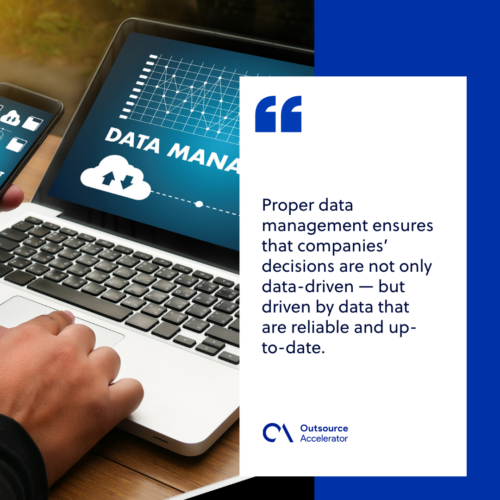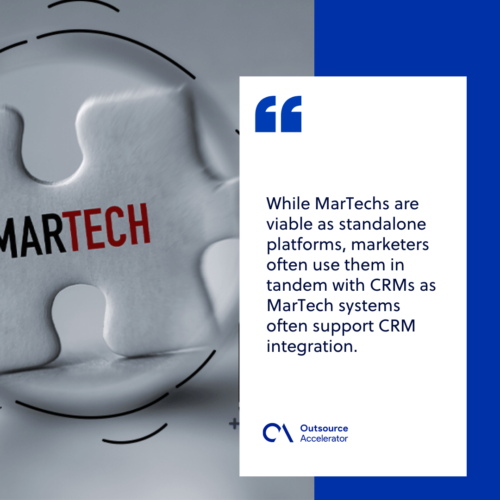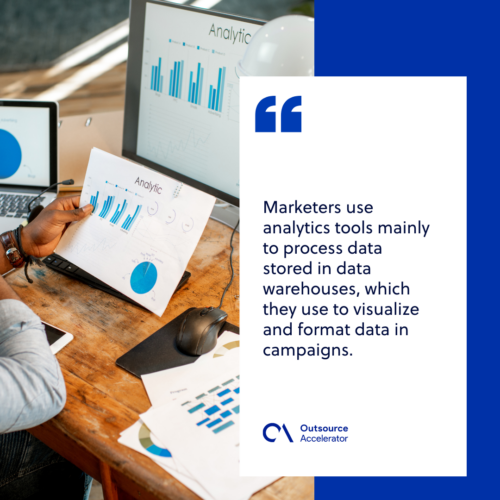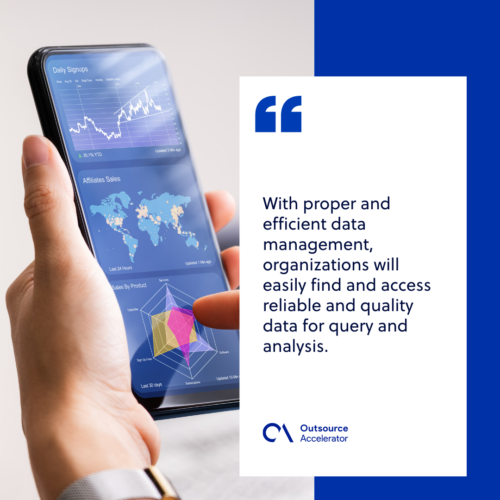Top data management platforms in 2025

The digital information age has led to a hundredfold increase in the amount of data that travels between individuals, institutions, and businesses daily.
With about 60% of companies worldwide utilizing data and analytics for cost-efficiency and drive-increase, experts forecast the global data usage to increase roughly 50% from its 2020 rate of 3 zettabytes (3,000,000,000,000 gigabytes) to 4.8 zettabytes in 2023.
Due to the rapid increase in data that needs to be processed, companies have become more pressed to arrive at solutions that will give them better data management capabilities.
Proving that necessity is indeed the mother of inventions, data management platforms have emerged to fill the niche that the information overload has made.
What is data management?
Data management is the process of organizing data to maximize its potential for an organization. This process includes the collection, organization, protection, and storage of an organization’s data for decision-making.
Proper data management ensures that companies’ decisions are not only data-driven — but driven by data that are reliable and up-to-date.
Today, various kinds of data management software are available online. These types of software can help in data management aspects, such as cataloging, search, and governance, for more efficient data retrieval and analysis.

Data management can be broken down into several components:
- Data preparation – used for cleaning and transforming data into the correct format and shape for analysis.
- Data pipelines – allow the automated transfer of data from system to system.
- Extract, transform, and load (ETL) – made to retrieve data from one system and transform it before being loaded into an organization’s data warehouse.
- Data catalogs – help organize metadata to build a complete picture of the data, provide a report of its changes, quality, and location, and make it easier to find.
- Data warehouse – a system where various data sources are consolidated. As digital storage, it also deals with different types of business data and is specially designed to aid in data analysis.
- Data governance – a set of rules, processes, standards, and policies meant to uphold data security and integrity.
- Data architecture – provides a formal approach for data flow creation and management.
- Data security – safeguards data from unauthorized access and corruption.
- Data modeling – allows the documentation of data flow through an organization.
Types of data management systems
Data management software can be classified into different systems, depending on their purpose.
While there are many kinds of data management systems, below are the most common:
Customer relationship management system (CRM)
A CRM is a type of database that holds all customer data. These data include personal information, sales conversion data, revenues, and opportunities, as well as subscription renewals and many others.
Sales representatives use CRM systems to keep track of all the accounts, leads, and other customer-related information. These systems can also store data on marketing activities, such as event participation data and sales calls.
Marketing technology (MarTech) systems
There are different types of MarTech systems, ranging from email service providers and advertising technologies to marketing automation platforms, among many others.
The common denominator among these systems is that they all help marketers run marketing campaigns and operations.
While MarTechs are viable as standalone platforms, marketers often use them in tandem with CRMs as MarTech systems often support CRM integration. MarTechs use CRM to run campaigns based on CRM data, which they automatically update as customer data change.

Data warehouse systems
Data warehouse systems are the primary customer data repositories where product satisfaction and usage data are often sent.
These data receptacles assist in various data requirements for different systems, such as financial applications and operations platforms, by presenting cleansed, standardized, and usable data versions.
Analytics tools
Analytics tools are a wide array of software used by marketing and sales professionals. Marketers use these tools for data visualization, reporting, and business intelligence, among many other purposes.
Marketers use analytics tools mainly to process data stored in data warehouses, which they use to visualize and format data in campaigns.

5 best data management platforms
As mentioned earlier, a wide selection of data management platforms are available online. To help you choose the best management platform for your brand’s needs, we’ve compiled a list of the five best data management platforms in the market.
Google Marketing Platform
Tech giant Google provides a unified marketing platform that merges data management and advertising on Google Cloud.
Google divides its marketing platform into two formats: enterprise and small business. The enterprise category allows integration with Google Analytics and its incorporated data management platform capabilities.
These capabilities include visualization, segmentation, reporting, and predictive analytics.
Adobe Audience Manager
Despite being more well-known for its range of software catering to creative professions, Adobe also offers data management capabilities in the Adobe Audience Manager.
This management platform lets users collect data from various sources, create new audience segment models, and gain deeper insights.
Adobe Audience Manager also integrates closely with the brand’s other products, especially Experience Cloud products.
Amobee
This independent advertising platform gives users access to end-to-end campaign and portfolio management with data management capabilities with its Discover tool.
These capabilities include segment creation, data onboarding, audience intelligence, sentiment and trends, etc. Discover integrates with the rest of the platform’s features for analysis, media planning, optimization, and execution.
Being a part of a complete media platform, Discover gives you access to features that many other data management platforms don’t have.
Lotame
Lotame is a privately held company focused on providing leading unstacked data solutions. Its data management platform is comprised of integrated products: Lotame Lab, Lotame Connect, and Lotame Data Exchange.
Users can use Lotame Lab for building, scaling audiences, and audience segmentation; Lotame Connect for customer data ingestion; and Lotame Data Exchange for buying audience data.
Lotame prides itself on having an unbundled platform, which means customers only have to buy what they need.
It’s also worth noting that Lotame’s platform is media-agnostic and lets users ingest data from almost any source.
Oracle BlueKai
Database software heavyweight Oracle’s data management platform, Oracle Bluekai data management platform, is included in Oracle’s Customer Experience (CX) solution.
The Oracle BlueKai platform seamlessly integrates with Oracle’s database software, enabling users to link their customer experience data with their financial information.
The platform can handle business-to-consumer (B2C) and business-to-business (B2B) transactions and includes personalization, segmentation, campaign management, customer acquisition, data activation, smart content, and customer intelligence capabilities.
Importance of having data management platforms
The significance of data management platforms lies in the importance of data management itself.

With proper and efficient data management, organizations will easily find and access reliable and quality data for query and analysis. This is an essential step toward achieving effective at-scale data analysis.
Utilizing these platforms aids in achieving data management capabilities that allow organizations to work at scale and ensure that the data they work with are more visible, reliable, and secure.







 Independent
Independent




